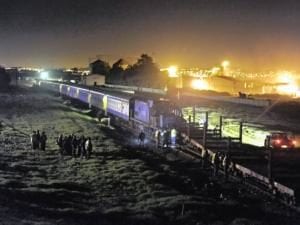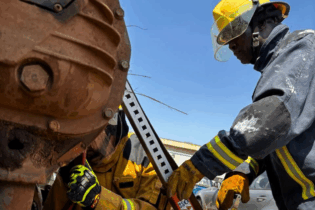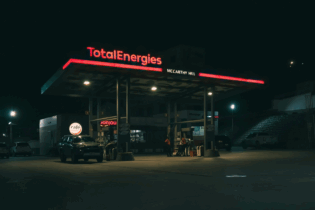A Metrorail train with about 500 passengers crashed into a stationary goods train at Fisantekraal train station near Durbanville on Tuesday night, hours after rail boss Lucky Montana disclosed to Parliament the shocking state of SA’s trains.
“If we had our wish, we would be scrapping these trains in the next three years, because they will not be safe to carry people beyond this date,” he said. Cape Town disaster management spokesman Wilfred Solomons-Johannes said on Tuesday night: “According to paramedics, only one adult male sustained slight injuries and no fatalities have been recorded.” Cape Town Fire and Rescue Services spokesman Theo Layne said firefighters had rushed to the scene when the accident was reported just after 7pm. “One coach was burned, but the extent of the damage is unclear,” he said. A passenger on train 2677, Glen van Oordt, from Kalbaskraal, said: “We were sitting in the train and suddenly there was a bump. We got a shock, but it was actually nothing serious. People got off the train when they realised something had happened.” He had boarded the train in Bellville and was to continue his journey by bus, arranged by Metrorail, to Kalbaskraal five stations from Fisantekraal, said Van Oordt. The train was on its way from Cape Town to Malmesbury and at Fisantekraal, the freight train had been waiting in a “loop” for the passenger train to pass, said Metrorail regional manager Mthuthuzeli Swartz. “The problem was that the freight train was not completely off the line and so it was struck by the passenger train. Fortunately, nobody was seriously injured,” he said. Swartz said 10 buses were arranged to transport passengers from Fisantekraal to their destinations, and that he expected Metrorail’s service on the line to return to normal on Wednesday. He said the goods train belonged to Transnet Freight Rail and it was ironic that the Metrorail head coach also belonged to Transnet Freight Rail. No electric powered units were used on this route. “We have a service on this line twice a day. Once in the morning, from Malmesbury to Cape Town, and then in the afternoon from Cape Town to Malmesbury. Like all other accidents, this accident will be investigated,” said Swartz. Earlier, Montana, the chief executive of parastatal the Passenger Rail Agency of SA (Prasa), which owns Metrorail, told MPs its trains failed to meet international standards in most respects except the heating system. Montana warned that many of the coaches – almost all of which are between 20 and 50 years old – would soon become unsafe. Standards that failed included modern safety features such as “automatic train protection” systems and the “enduring crashworthiness” of passenger coaches.“If we had our wish, we would be scrapping these trains in the next three years, because they will not be safe to carry people beyond this date,” he said.
Prasa uses 4 638 coaches in its urban Metrorail operations and 1 223 on its long-distance Shosholoza Meyl. According to a document tabled at Tuesday’s parliamentary briefing, the average age of Metrorail coaches is 40 years, while the average age of coaches in the Shosholoza Meyl fleet is 33. The government plans to invest heavily in new rolling stock over the next 20 years, acquiring 7 224 new coaches. Montana said a feasibility study – involving Prasa, the National Treasury, and the departments of Transport and Public Enterprises – showed that 7 224 new coaches were needed over the next 20 years. “The first 3 600 coaches will be bought in the first 10 years.” He said a request for proposals for the design of new coaches had been sent to certain companies on April 19. The preferred bidder would be announced in November and, after negotiations, the contract would be signed by the middle of next year. Montana said given the state of the coaches operated by Prasa, many were asking why new coaches were not being bought immediately. “We can buy the trains overseas… and we can have them next year. But we… must use this investment to revitalise our rail engineering industry. So these trains… will be built in South Africa. “We expect the first train to be tested in 2015.” He said the programme would create “about 65 000 jobs”. It would also provide an opportunity to train a new generation of railway engineers and artisans. Source: http://www.iol.co.za






